Keyword analysis is essential for our SEO strategy, as we already know, since when we determine what people want and are looking for, it will be easier to respond to it and satisfy the needs of our clients. It is therefore important that this process is done correctly, so that together with other aspects of SEO, we get our content to be of quality and respond to the needs of users..
It is important that we know how to use the main tools to be able to use them correctly and we can make the most of all its options. One of these tools is Sistrix, which offers different options and great possibilities when it comes to doing keyword research.
What is Sistrix?
Sistrix is a tool that provides data on the performance of your website in the main search engines. This tool allows you to improve your strategies, since it will facilitate the search and analysis of keywords to create new content or optimize the one you have already created.
Thanks to the Sistrix tool, we will be able to achieve the following for our site:
- Optimized keywords to attract search engines and engines
- Optimal Title, URL, and Description for High CTR in Rankings
We must bear in mind that Sistrix tracks the data on a weekly basis, so the analysis that we do on keywords will always be updated, with the latest data obtained by the tool. Thanks to this tool you will be able to analyze large amounts of data in a simple and fast way and see the visibility index of each website that you want to analyze..
Sistrix is a tool that offers different options when it comes to analyzing sites, but in this case we are going to focus on the utilities it offers to do research and use of keywords. We can also see ideas to create new content and analyze our competition to find new opportunities and weaknesses on our website.
1. How to use Keyword Explorer in Sistrix to analyze keywords
One of the main actions that we must carry out when we want to carry out a study of keywords, is to carry out an analysis of them in order to determine which ones we are interested in using. That is why we must start step by step to be able to analyze and see the options we have and what terms we are interested in using. At Sistrix we have the option of doing a general analysis of keywords, following the instructions that we give you below.
Step 1
The first thing you have to do is enter the application
sistrix
Once you are logged in, you have to put the keyword or domain that you want to analyze in the search engine. In this case we have used the following keyword..
instagram music
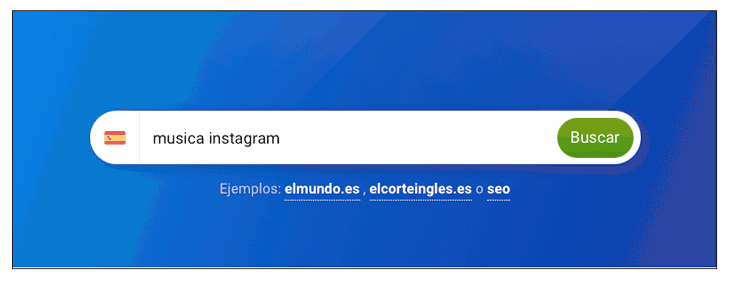
Step 2
Now we will see that some results appear for this keyword. These results will inform us about the following data.

search volume
This is the number of monthly search queries for this keyword on Google for the chosen country.
You will be able to see the average monthly traffic (over 12 months) to exclude any seasonal influences. Below the search volume, you'll see the number of organic clicks for this keyword. Depending on the SERP structure, this value can differ greatly from the search volume.
You will also be able to see monthly trend data from January through December. This serves to see if there are specific trends for seasonal themes.
Keyword Profile
In this box you will find three useful values related to the keyword you are analyzing:
The level of competition of the keyword in the organic index of Google using a number between 0 and 100. Remember that the higher this data is, the more difficult it will be to position that keyword.
You will also be able to use the type of device from which the most searches are made for that keyword.
On top of that, you'll see the average click price you'd pay in Google Ads, if you're looking to get a paid click for this keyword.
Global search volume
This chart will help you estimate the search volume in other countries, showing those where this KPI is highest. The search volume is standardized for all countries and the annual average is always divided into 12 months.
search intent
It is an evaluation of the search intentions of the selected keyword.
Types of search intent:
- Know: Informative search intent means that the user seeks to expand their knowledge on a specific topic.
- Do: This type of search has a transactional search intent. User intent "Do" is about the user wanting to do something. Often it's to buy something, but sometimes it's a download, installation, or other active process.
- Website – These are search requests from the user who are simply looking for a website. They may not remember the correct name or the full domain name. You can also include a search for products with the brand included.
- Website: These are users who are generally looking for a local business. These searches often trigger the Google Maps feature in the SERP.
Step 3
If you continue scrolling down, you will see more data appear for this keyword.

Contains all keywords
Similar keywords contain the same keyword component of the seed keyword. Thanks to this feature, you can find and rank long-tail keywords.
search suggestions
This function shows you the search queries that have a semantic relationship with the starting keyword. This means that the terms do not necessarily contain the starting keywords, but are similar and comparable.
Questions
This feature will show you Google queries that contain not only the start keyword, but also the typical question words (like where, when, what, etc.). This will help you easily understand the intent behind the keywords.
Step 4
You will also have another section with the characteristics of the SERP and the URLS that position for that keyword.
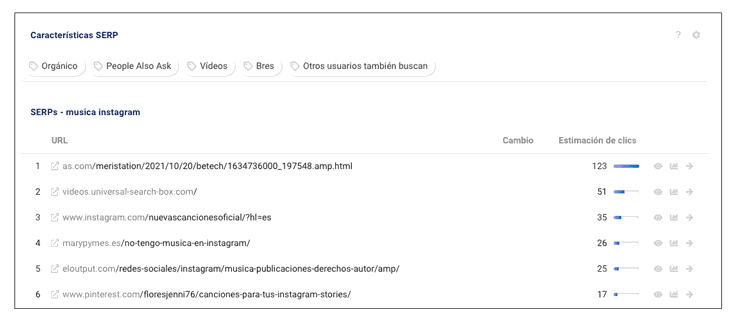
step 5
If you want to see how that keyword has evolved in some of the URLs that appear, click on the analysis symbol and you will be able to see this data. In this case we see that they remain quite stable.
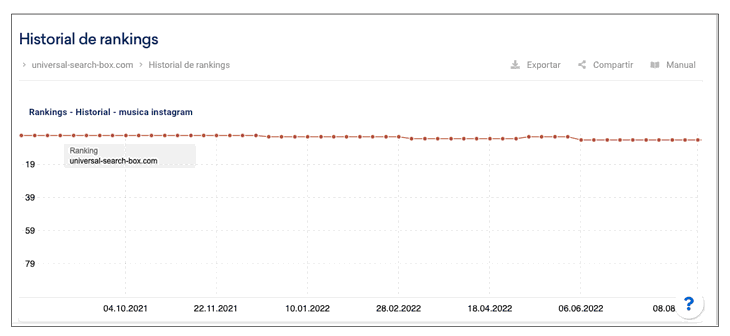
step 6
In the event that you want to export this data, you can do so by clicking on this option at the top of the tool.

2. How to use Keyword Discovery in Sistrix to analyze keywords
Another of the options that Sistrix has is that of Keyword Discovery, which is used to carry out an analysis of keywords in order to evaluate them and determine what type of content is interesting to create for your website. To perform this analysis, you have to carry out the following process.
Step 1
Enter the
https://es.sistrix.cy...yword-discovery section. Now in the search engine enter the keyword or term you want to analyze. You can select the country of analysis and also the option that best suits your needs in the "Search settings"
- Majority Match: At least one of the keyword components must appear
- Match group of words: all components of the keyword must appear but the order is irrelevant. This would be the default configuration.
- Exact Match: All keyword components must appear in the order in which they are entered.
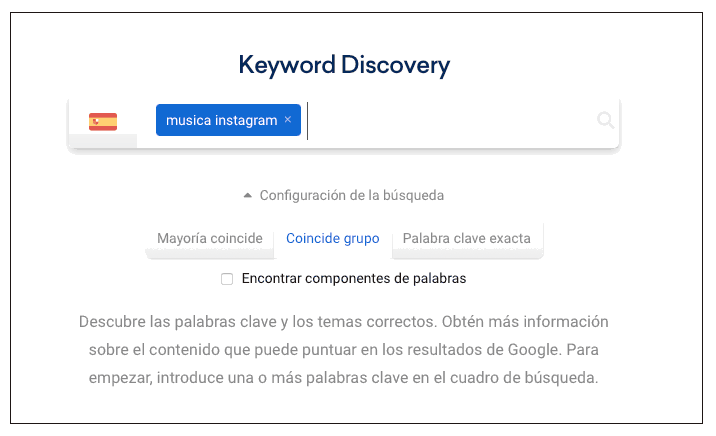
Step 2
Now you will see that different results appear based on the keyword that you have entered. In the upper right corner you can see more information about the keywords found as well as their total search volume. The data that we will see for this keyword suggestions are the following:
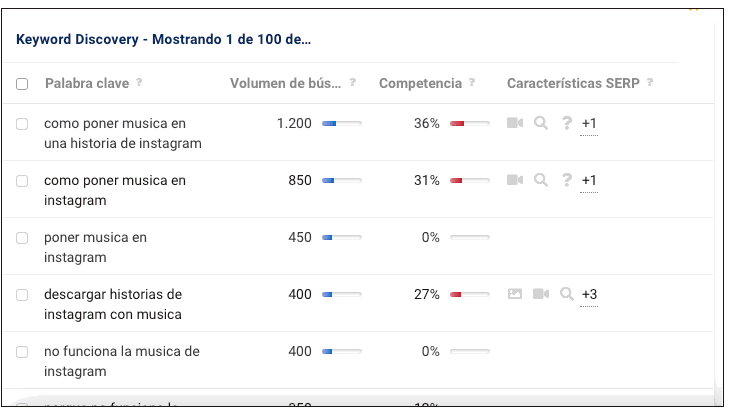
Keyword
The query exactly as written in Google. Keywords can be made up of one or more words or word elements.
search volume
Number of monthly search queries for this keyword on Google for the chosen country. Average monthly traffic (over 12 months) is shown to exclude any seasonal influences.
Competition
This indicator shows the level of competition for the keyword in the Google organic index: 0 (low) to 100 (extremely high). The higher this level is, the more effort it takes to rank organically for the keyword.
SERP Features
Types of results found for the keyword in the SERP. These might be:
If you pass the mouse over these icons, you will know what each of the icons that appears in the results refers to.
Competition
This indicator shows the level of competition of the keyword in the Google organic index: 0 very low up to 100 which will already be extremely high. The higher this level is, the more effort it takes to rank organically for the keyword.
cpc
Average click price you'd pay in Google Ads if you wanted a paid click for this keyword. It is an average value, so it could vary.
Trend
Relative seasonal development of search volume month by month. This allows you to quickly understand if the keyword's search volume is higher during specific months.
search intent
The search intent shows what goals the user wants to achieve with the search query. Regarding the search intention, Google differentiates between the following types: know, do, website and visit as we saw in the previous section in a developed way.
If you click on some of these data, you will see that they are ordered based on them. For example, you can click on the competition, to see the Keywords related to yours that have less competition.
Step 3
On the side you can see the data that appears for each of the keywords in the results by clicking on it. In this way you can analyze each of them based on the following data.
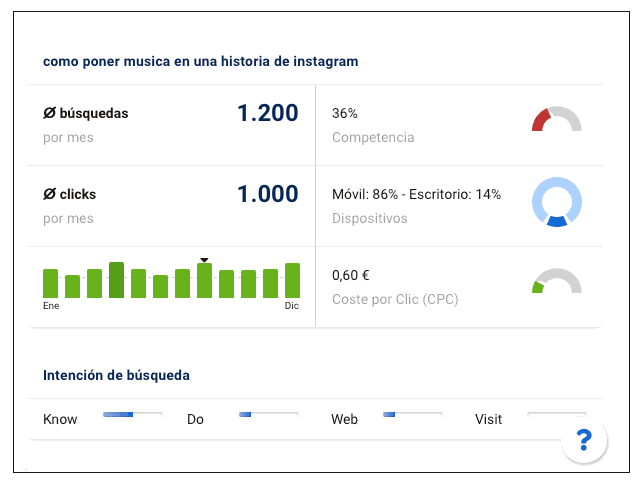
Step 4
Now at the top you will see that you have different filter options and settings to select or add to your analysis.

step 5
In the event that, for example, you want to filter the search, select filter at the top and you will see that the following menu is displayed. Here you can select the type of filter you want to apply.
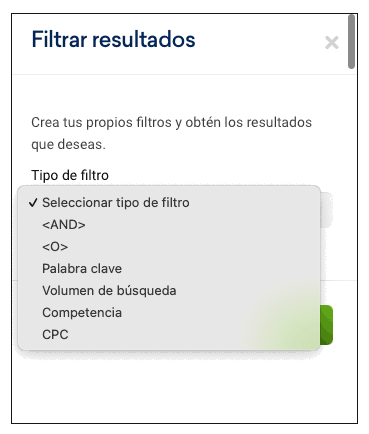
With this filter applied, you will see the results change.
step 6
Another of the options that you have in Keyword Discovery is the possibility of seeing the groups of keywords, to select those that you want to appear in the analyzed keywords.
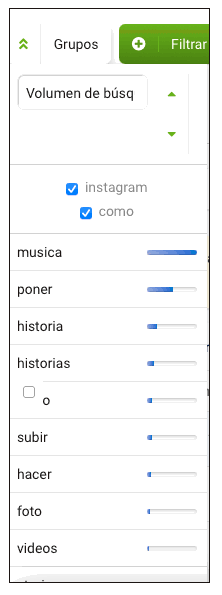
In this way you can select what types of keywords you want to appear to establish the type of content you want to create and what you want to focus on.
3. How to analyze your keywords and those of your competition in Sistrix
Another of the functions that this tool offers us is the possibility of analyzing the keywords that predominate in our domain, and those that predominate in those of our competition's sites. In this way you will be able to get new ideas and know what type of content is interesting to create since you will have good results with it.
Step 1
In order to analyze this you must enter the Sistrix website and enter the domain you want to analyze. In this case we will put ours.
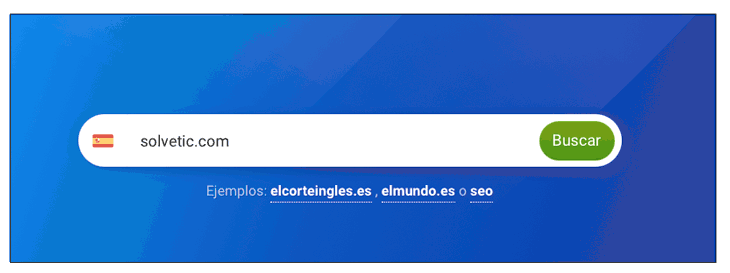
Step 2
Now we see that Sistrix gives us an analysis on the domain that we have entered. We will see that we have different data such as:
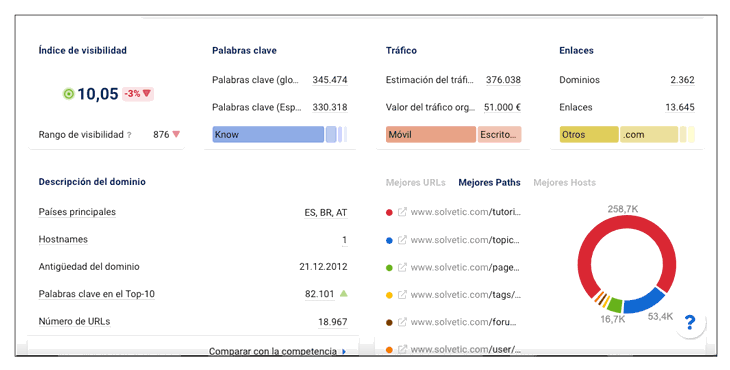
In this case we are going to focus on the analysis of keywords. To do this, click on the Keywords section. We can select if we want to see this analysis globally or focused on the country that we have selected in the search engine.
Step 3
Now you will be able to see the main keywords that position for that domain, what are their statistical data and the URL created for that content.

Step 4
At first, you will see that this data is ordered by the number of clicks in the last 12 months, but by clicking on another of the metrics that is displayed, you will be able to order it by the one you select. In this way, if you want to see the keywords that have less competition, click on this tab.

In this way, you will be able to take advantage of the opportunities you have to improve your content by looking, for example, at the position, since this way you will be able to improve the content created for a keyword that has a good volume but is not positioned at the top, optimizing its content and thus increasing the number of clicks.
Note
In the event that you want to analyze the competition, you must do the same process by entering this domain. In this way you will be able to see for which keywords it is positioning for that site. Here you must analyze the content opportunities, seeing what keywords they have, for example, that are not in a good position but with high volume or those that have little competition. You can also enter the links to see what type of content they have created with this Keyword and find opportunities for improvement and be able to position yourself better than your competition for this keyword.
4. How to analyze multiple keywords in Sistrix
Another of the options that we have in Sistrix is to analyze several keywords to see which of them is worth using to create our content if we hesitate between several. In this way you will be able to select based on the statistics you see, which one interests you the most and with which you will have better opportunities to position. This is a simple process that will allow you to compare different Keywords easily and quickly. In order to carry out this process, you must do the following.
Step 1
The first thing will be to enter the Sistrix application. Now directly on the main page, you will see that a section called "Keywords" appears at the top.
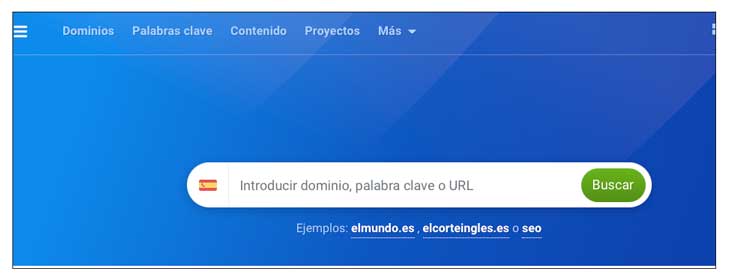
Step 2
The next thing you should do is put the keywords you want to analyze in the search engine that appears. To be able to separate one from the other, you must press the Shift + space key. In the event that you have a list created (up to 100) of keywords, you can upload it directly to the search engine. You must click on the country you want to search for and select "search".
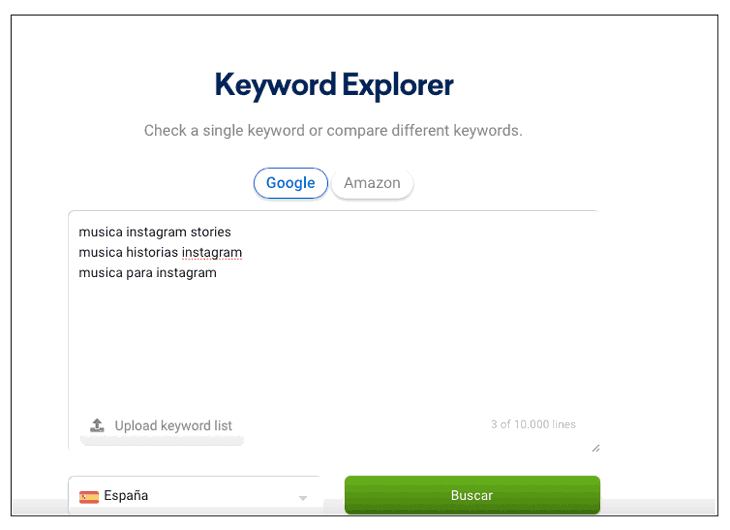
Step 3
You will now see results appear for all the keywords you have entered. Based on this, select the one with the best metrics. In this case we see that "music stories instagram" is the one with the most volume and the least competition, so it will be the one with the best opportunity to position ourselves and obtain the best results.

Step 4
If you click on this keyword, you will see that a new window opens in which you can see all the analysis on it in more detail and with more statistical data.
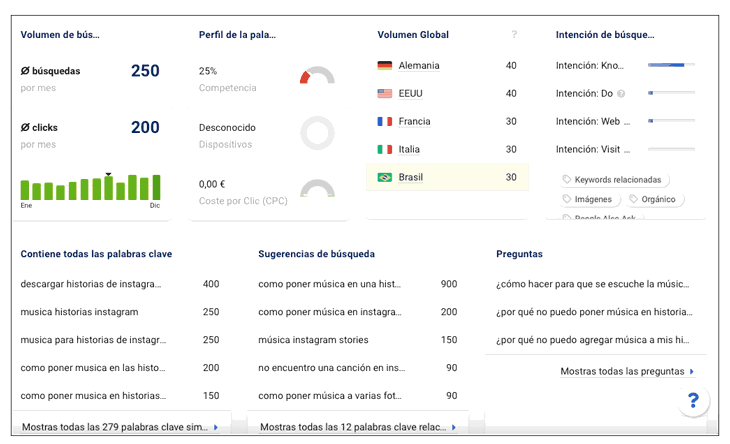
step 5
If you continue scrolling to the bottom, you will be able to see the content that has already been created for this keyword, so you can analyze it and see how to improve it.
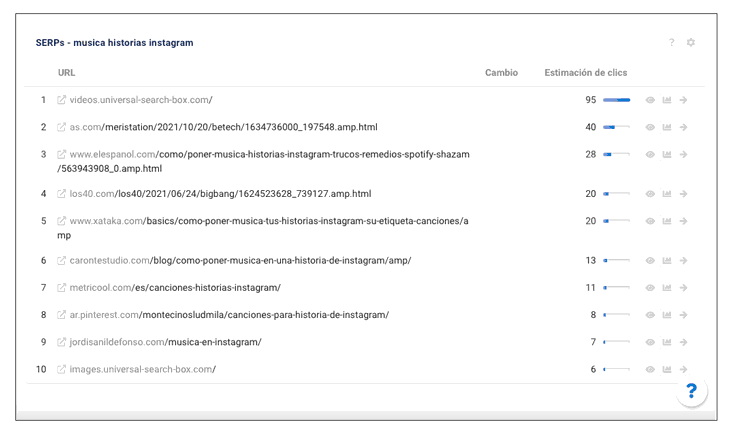
step 6
On the side you will be able to other types of data, depending on your interests for this keyword. The data offered by Sistrix are the following:
keyword ideas
- Contains one of the words
You can click on each of these sections to see the data it offers in relation to the analyzed keyword.
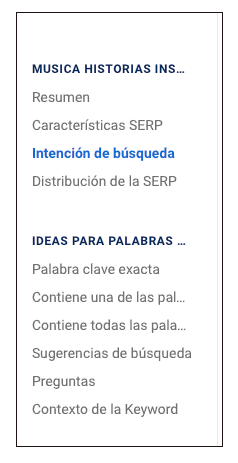
In this way you can analyze the different keywords that you want to position and see which of them offer better opportunities.
These are the options offered by the Sistrix tool to analyze keywords and thus obtain different data from both your site and the competition, in order to make use of them and create new content or optimize the one you have already created. It is a utility that is easy to use and that thanks to the rapid updating of its data, we can always be up to date with the statistics that interest us for the analysis of keywords.